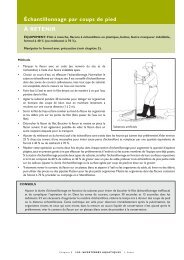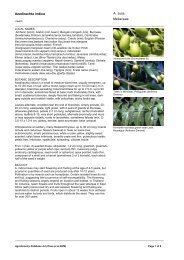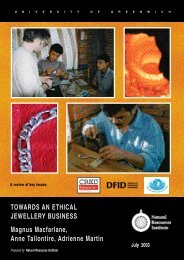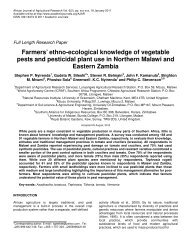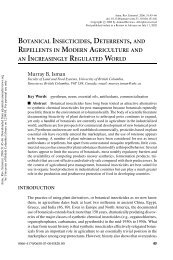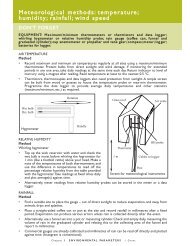African Water Laws - Natural Resources Institute
African Water Laws - Natural Resources Institute
African Water Laws - Natural Resources Institute
You also want an ePaper? Increase the reach of your titles
YUMPU automatically turns print PDFs into web optimized ePapers that Google loves.
JUMA & MAGANGA<br />
Box 4. Searching for justice from statutory organs<br />
In 1969 Simon Dangala in collaboration with 5 other villagers started the Manyenga irrigation canal. They invited other villagers to<br />
join in, and soon the canal had a membership of 36 villagers, most of them cultivating rice. As the membership grew, tensions started<br />
emerging among them, especially regarding maintenance of the canal, and competition over scarce water. All the other villagers<br />
who started the canal have since died. In 1997 SD (who actually lives in another village, Mawindi), applied for and got a 33-year<br />
Right of Occupancy for 59 acres of land on the upstream of the canal, creating tensions with villagers who depended on the canal<br />
downstream. SD did not have the ability to cultivate all the 59 acres, cultivating only about 4-5 acres, and renting the rest for between<br />
T. shs 15,000/= and T.shs 20,000/= per acre. The Rufiji Basin <strong>Water</strong> Board encouraged the villagers to form a <strong>Water</strong> Users<br />
Association in order to benefit from a World Bank-assisted Smallholder Irrigation Project. In 1998 the villagers applied for <strong>Water</strong> Right<br />
for their Association, but SD objected, since the canal passed through his land. He demanded a “compensation” of T. shs 150,000/=<br />
for his efforts in maintaining the canal since 1969, before he could allow the canal to pass through “his land”.<br />
In 2001, SD filed a civil case before Rujewa Primary Court, alleging that Adriano and Ayubu had encroached and trespassed into his<br />
duly registered canal by building bricks (Simon Dangala vs AdrianoTandika and Ayubu Kanyamala Civil Case 38 of 2001, Rujewa<br />
Primary Court). The canal in question was registered in Dangala’s name and given number RBWO 96. He traced his ownership to<br />
the canal to a 1997 letter from the Rufiji Basin Office. The letter urged him to pay for the <strong>Water</strong> Right before 1st June 1998, and on<br />
14th October 1998 he was given the <strong>Water</strong> Right, stipulating terms and conditions for his use of water. The complainant claimed that<br />
after getting the water Right he built a canal in 1999 by engaging the services of paid casual labourers. On 19th October 2001 while<br />
returning from his farms he found the respondents constructing a canal to draw water from the source, through his farms SD denied<br />
that he was a member of the Irrigation Association of Manyenga “A”. Adriano Tandika told the Primary Court that he farmed at<br />
Manyenga, although he was not a resident of the village. He only used the Manyenga “A” by virtue of being a member of the<br />
Irrigation Association of Manyenga “A”, which he joined in 1997. He alleged that when he joined the canal membership, it was under<br />
the leadership of SD. The canal broke down in 1997, and Adriano joined in the canal repair, and he rose to the position of Assistant<br />
Secretary in the Irrigation Association. He further testified that, in 1998 misunderstandings arose when SD demanded and was given<br />
Tshs 150,000/= for his role in the founding of the canal. Adriano further contended that SD’s <strong>Water</strong> Right was RBWO 96, whereas<br />
the canal they were building had 200 registered members, with a <strong>Water</strong> Right RBWO 102. The Primary Court, comprising of the<br />
Primary Court Magistrate and two Court Assessors visited the canal in dispute. The court found that SD had no claim over the<br />
registered canal RBWO 102, which the two respondents were building. In addition, the Primary Court noted that SD’s <strong>Water</strong> Right<br />
(RBWO 96), had been revoked by the Rufiji Basin <strong>Water</strong> Office. SD lost his case and was ordered to pay the cost incurred by the two<br />
respondents. SD appealed to the District Court (Simon Dangala vs Ayubu Kanyamala and Adrian Tandika, Civil Appeal No. 2/ 2001).<br />
The District Court dismissed SD’s appeal and noted that (a) The two respondents were given ownership of water registered as<br />
RBWO 102 as formal owners of Manyenga “A” Irrigators Association (b) Though it is true SD built the canal of Manyenga “A”, he was<br />
compensated for the labour and costs he incurred.<br />
Highlights and implications of proposed water reforms<br />
The National <strong>Water</strong> Policy (2002) has not yet been incorporated into legislation. <strong>Water</strong> resources management<br />
in Tanzania is still governed by the <strong>Water</strong> Utilisation (Control and Regulation) Act No. 42 of 1974, which<br />
relates to the administration of granting of rights to water users. The regulations provide in detail for the<br />
granting of water rights, and determine water use fees for various water uses.<br />
The new water policy proposed a number of measures, which may have an impact on prevailing customary<br />
water laws including:<br />
Formation of Sub-Catchment/Sub-Basin Boards<br />
The policy recognises that the extensive size of current water basins makes management of water resources<br />
at this scale a difficult task. The policy recommends the formation of sub-boards or sub-committees of water<br />
boards. These will be made up of representatives of public bodies, institutions and water users’ associations<br />
in the area of the sub-catchment/committees of the board. Customary and traditional institutions are barely<br />
considered or mentioned. Even if traditional water management is incorporated, the functions of the subcatchment/committees<br />
are likely to be more formal to include close management of the preparation and<br />
implementation of water use plans and resolution of any local water conflicts.<br />
Involvement of district level water organs<br />
The policy recommends close involvement of district councils and local government authorities in basin<br />
water boards and sub-catchment boards. These organs will offer expert advice to water users, protect natural<br />
resources of the village and Wards, make water resources management by-laws, and assist in resolution of<br />
disputes – hence, the district level organs will be part and parcel of the formal water resources management<br />
structure.<br />
3-6



